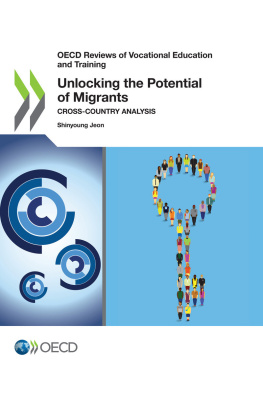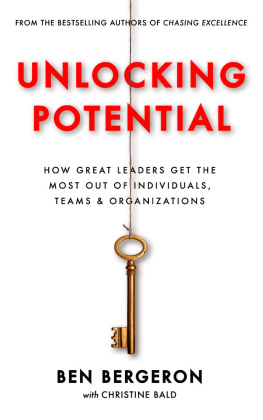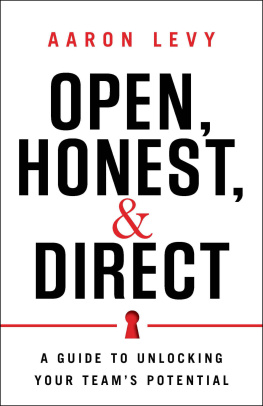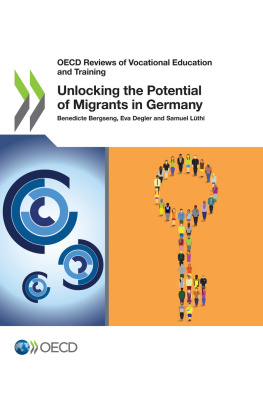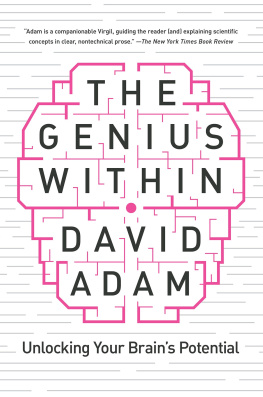Jeon - Unlocking the Potential of Migrants
Here you can read online Jeon - Unlocking the Potential of Migrants full text of the book (entire story) in english for free. Download pdf and epub, get meaning, cover and reviews about this ebook. year: 2019, publisher: OECD Publishing, genre: Politics. Description of the work, (preface) as well as reviews are available. Best literature library LitArk.com created for fans of good reading and offers a wide selection of genres:
Romance novel
Science fiction
Adventure
Detective
Science
History
Home and family
Prose
Art
Politics
Computer
Non-fiction
Religion
Business
Children
Humor
Choose a favorite category and find really read worthwhile books. Enjoy immersion in the world of imagination, feel the emotions of the characters or learn something new for yourself, make an fascinating discovery.
Unlocking the Potential of Migrants: summary, description and annotation
We offer to read an annotation, description, summary or preface (depends on what the author of the book "Unlocking the Potential of Migrants" wrote himself). If you haven't found the necessary information about the book — write in the comments, we will try to find it.
Jeon: author's other books
Who wrote Unlocking the Potential of Migrants? Find out the surname, the name of the author of the book and a list of all author's works by series.
Unlocking the Potential of Migrants — read online for free the complete book (whole text) full work
Below is the text of the book, divided by pages. System saving the place of the last page read, allows you to conveniently read the book "Unlocking the Potential of Migrants" online for free, without having to search again every time where you left off. Put a bookmark, and you can go to the page where you finished reading at any time.
Font size:
Interval:
Bookmark:
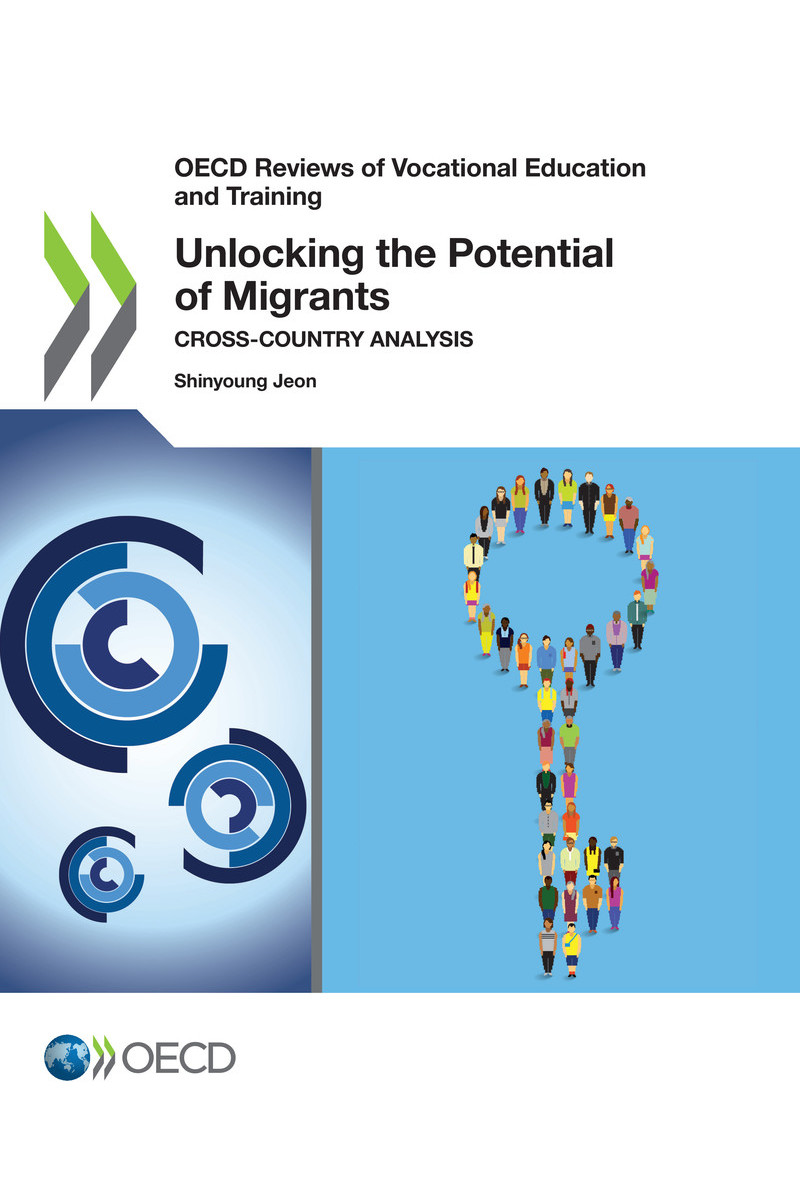
Jeon, S. (2019), Unlocking the Potential of Migrants: Cross-country Analysis , OECD Reviews of Vocational Education and Training, OECD Publishing, Paris, https://doi.org/10.1787/045be9b0-en .
Countries across Europe have welcomed a significant number of migrants, and in particular young humanitarian migrants, over the last five years. This rapid influx has raised questions as to how these countries can best integrate these young migrants and their families into their countries, many of whom are desperate to improve their quality of life in their new homes. Education and training, and resulting labour market opportunities, are crucial to realising these aspirations.
Vocational education training (VET) in particular is a proven and effective tool for transitioning from school to work and its benefits are even greater for disadvantaged youth. But while VET has been fundamental in the integration of many new arrivals to date, in many cases it has been used sporadically or unsystematically. In addition, due to limited resources and differences in culture, language and skills system, young migrants are often unaware of the VET opportunities available. In the cases where they are aware, many struggle to access the right programmes and lack employer connections.
This report focuses on this untapped potential of using VET as a tool to speed-up and enhance the integration of young migrants in the host country. Realising this potential will require strategies that, rather than making small piecemeal adjustments, aim to re-engineer VET systems for the long-term.
Some OECD countries are at the forefront of innovative approaches to VET and preparatory programmes aimed at migrants and refugees. This report highlights some of these effective and innovative practices, while accounting for individual country circumstances. Just as one of the main recommendations of this report is support for peer-learning and exchange of approaches to common challenges, the hope is that this report presents a learning opportunity for communities, VET institutions, local authorities and governments as well as volunteers and staff that work with humanitarian migrants.
The structure of the report follows the path that a migrant might take, from learning about the opportunities presented by VET, to gaining access to VET systems, to realising their full potential through tailored programmes and work placements. In parallel, the report explores the challenges and opportunities faced by stakeholders along the same path, including government, education providers, and employers.
Ultimately, the key message is that building strong, flexible and inclusive VET systems where migrants and refugees can succeed results in broad benefits not just for migrants, but also for the wider group of students with disadvantaged backgrounds.
This cross-country report was prepared under the project Unlocking the Potential of Migrants through Vocational Education and Training, together with a country review of Germany that studies the same theme. It draws on national experiences across OECD countries with focuses particularly on Germany, Italy, Sweden and Switzerland. The European Commission and Switzerland sponsored this cross-country project and the publication of this report.
Shinyoung Jeon from the OECD Centre for Skills drafted this report, with research assistance from Toma Savitki, Rosa Neri and Edoardo Magalini. Benedicte Bergseng and Samuel Lthi from the OECD Centre for Skills, and Eva Degler and Thomas Liebig from the International Migration Division within the OECD Directorate for Employment, Labour and Social Affairs gave valuable input and advice. Jennifer Cannon, Charity Kome and Elisa Larrakoetxea provided valuable administrative support. Lauren Thwaites provided valuable support in the editorial and production process. Pascal Marianna assisted in obtaining official Eurostat data.
Anthony Mann oversaw the preparation of this report as Head of the VET and Adult Learning team within the OECD Centre for Skills. Viktria Kis, Magorzata Kuczera and Pauline Musset within the VET and Adult Learning team provided additional input. Francesca Borgonovi from the Directorate for Education and Skills, Kim Samuel from the OECD Centre for Skills and Anja Meierkord from the Directorate for Employment, Labour and Social Affairs also gave useful comments. Support throughout the project was received from Montserrat Gomendio as Head of the Centre for Skills, Dirk van Damme as Head of the Skills beyond School division in the Directorate for Education and Skills, Andreas Schleicher as Director of the Directorate for Education and Skills, Stefano Scarpetta as Director of the Directorate for Employment, Labour and Social Affairs and Ludger Schuknecht, Deputy Secretary-General at the OECD.
The OECD would like to thank many colleagues in Germany, Italy, Sweden and Switzerland for their constructive engagement throughout the study, and especially: Oliver Diehl, Erik Hess and Peter Thiele at the Federal Ministry for Education and Research in Germany; Fabio Roma and Valeria Scalmato at the ANPAL ( Agenzia Nazionale Politiche Attive Lavoro ) in Italy; Cristina Pontis, Malin Mendes, Carina Lindn, Jacob Johansson and Christina Mnberg at the Ministry of Education and Research in Sweden; Marlene Furrer, Frederic Berthoud, Benedikt Hauser and Truong-Dinh An-lac at the State Secretariat for Education, Research and Innovation and Tsering Tsewang and Thomas Fuhrimann at the State Secretariat for Migration in Switzerland. We also greatly appreciate the time given by hundreds of other colleagues who contributed to this report by sharing their experience and perceptions on the topic through stakeholder interviews throughout the project period. These include participants from a workshop held in Bremen, Germany, which brought together policy makers, researchers and experts from Germany, Switzerland, Norway and Sweden.
Font size:
Interval:
Bookmark:
Similar books «Unlocking the Potential of Migrants»
Look at similar books to Unlocking the Potential of Migrants. We have selected literature similar in name and meaning in the hope of providing readers with more options to find new, interesting, not yet read works.
Discussion, reviews of the book Unlocking the Potential of Migrants and just readers' own opinions. Leave your comments, write what you think about the work, its meaning or the main characters. Specify what exactly you liked and what you didn't like, and why you think so.

